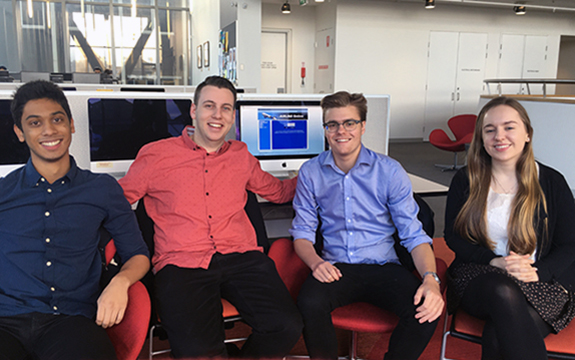Swinburne Aviation Management students ace global online tournament

In Summary
- Aviation Management students have won an international competition using a software program that simulates the establishment and operation of an airline
Swinburne Aviation Management students have taken out first place in a first-ever international competition using Airline Online, a software program that simulates the planning, establishment and operation of an airline.
Organised by Simulate, which provides training tools for the airline industry, universities and colleges, the tournament was first suggested by academics in Swinburne’s Aviation program.
Students in groups form virtual airlines. They then:
- establish a geographical base
- select a specific business model
- acquire a fleet
- construct network schedules
- set airfares and cargo prices
- configure each aircraft to specific seating arrangements
- set service level profiles
- set employee wages
- optimise advertising methods and fees
Over the course of three simulated years, the airlines compete against each other for customers across route structures set by the students according to demand based on real-world data.
“They compete for market share and attempt to earn profit or perhaps learn to adapt their airline to survive – just like in the real world,” says Swinburne Aviation Unit convenor Dr Peter Bruce.
The software builds on management, marketing, economics and finance theory taught in Swinburne’s Aviation program and relies on this knowledge in the airline simulation activity.
“In this way, students are able to put the theory into simulated practice, exposing them to activity fairly reflective of the aviation industry.”
The competition
Twenty organisations worldwide, including 16 universities, took part over two months this year.
From a total of 5000 possible aircraft for all airlines, Swinburne’s team of students scheduled 481 aircraft serving 508 city pairs.
“This is outstanding as the scheduling process for each aircraft is very demanding and time consuming,” Dr Bruce says.
“To explain, appropriately sized and ranged aircraft types must operate on each route against forecast demands. Proper turnaround times have to be scheduled to avoid potential ground handling delays, and allowance made for frequent scheduled maintenance.”
The team’s market share result among the 20 simulated airlines was 24.55 per cent of passengers carried and 53.95 per cent of cargo.
“This is a noteworthy effort given the high level of competition.”
Overall the team won due to having the highest liquidated value of all airlines in the tournament.
The five Bachelor of Aviation (Management)/Bachelor of Business students representing Swinburne were:
- Nicole de Man
- Ben Howe
- Dillon Jeremiah
- Borislav Kaplan
- Jake Krizmanic
Plans are in progress for the next tournament later this year.

